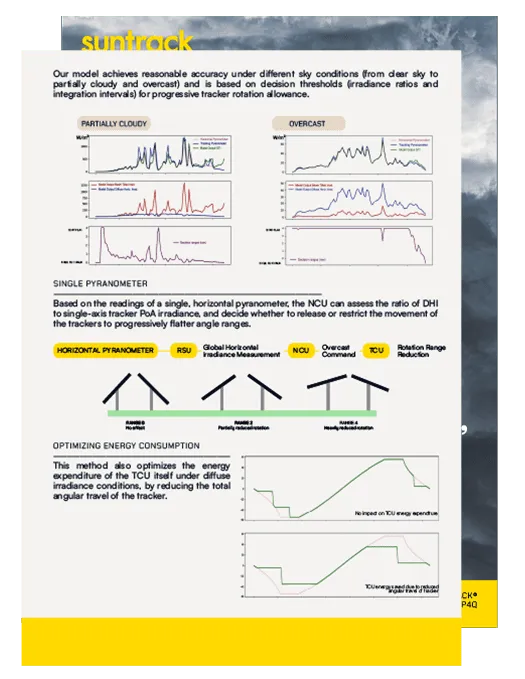Advanced Overcast
New Method to Optimize the Performance of Photovoltaic Trackers in Overcast Conditions.
Up to +5.51% Energy Production
When irradiance is low, your performance shouldn't be
In overcast days, when diffuse irradiance is predominant, tracking the Sun position yields less energy production than staying at a lower angle to capture irradiance from a bigger portion of the sky dome, and it may also result in a waste of energy for unnecessary movements of the tracker.
Conventional methods are based on dual irradiance measurements (horizontal and tracking pyranometers), or pictures from the sky (from satellite images or on-site skycams) with complex processes requiring intensive computation and/or data flows.
Suntrack has developed a new algorithm, which can estimate the value of BTI (Beam Tilted Irradiance) and DHI (Diffuse Horizontal Irradiance), based only on the measured value of GHI (Global Horizontal Irradiance), together with the theoretical Solar Elevation (a), to correct the position of single-axis trackers and optimize energy generation.
This approach maximizes the captured irradiance and minimize the energy expenditure during overcast periods, requiring a single horizontal pyranometer.
Up to +5.51% energy production during overcast periods
Successfully tested in the laboratory and in the field, the new Suntrack’s algorithm increases the production of the inverters, and optimizes the energy expenditure of the TCU itself, under diffuse irradiance conditions.
Efficient: Minimum resources required (single pyranometer).
Autonomous: Fully local operation, internet connection not requiered.
Functional: Works from day one; no need of calibration or training.
New Planning System
The Advanced Overcast includes a revolutionary planning system to further optimize battery consumption. This new functionality does not require training or calibration and is operational from the beginning.

